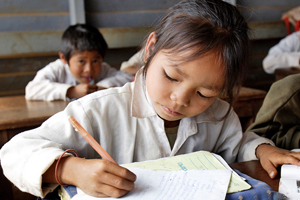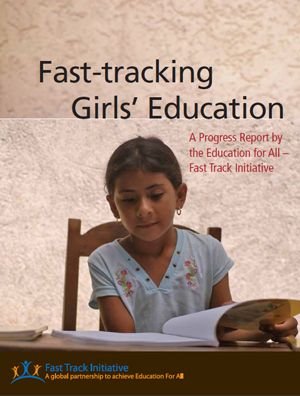In recognition of the 100th anniversary of International Women's Day, the Education For All – Fast Track Initiative (FTI), an international partnership dedicated to ensuring quality basic education for all children, launched a new report that highlights the fundamental importance of girls' education for economic and social development of individuals, families and nations.
Fast-tracking Girls' Education details the encouraging progress that girls have made in enrolling in school and, increasingly, completing their education. At the same time, the publication warns that in developing countries, too many girls are not in school, and many girls face continuing health risks, harassment, and danger just walking to class.
"Investment in girls' education makes simple economic sense," Carol Bellamy, Chair of FTI, said. "No country has ever emerged from poverty without giving priority to education. And if education is the escape door from poverty, then girls' education is the key to that door. On the 100th anniversary of International Women's Day, I would like to stress that bolstering girls' education is not a question of charity, but of laying the foundation for a thriving economy and a just society."
The Australian Government believes education, particularly for girls, is one of the best investments in development and has made education the flagship of the aid program. Education for girls has huge benefits for individual young women and for their children, families and broader society, in this generation and the next. A child born to a mother who can read, is 50 per cent more likely to survive past the age of five. Adolescent girls with formal education are shown to have lower HIV and AIDS rates, lower adolescent pregnancy rates, and improved health.
Australia has provided $50 million to the Education for All Fast Track Initiative to support their work to get more children into school, improve education quality, and achieve gender equity in many classrooms.
Girls' education and the Education for All Fast Track Initiative:
- 19 million more children enrolled in school between 2002 and 2008 in over 40 developing countries supported by FTI. 54 per cent of those children were girls, showing that girls are at last catching up with boys.
- In African countries supported by FTI, 62 per cent of children entering school for the first time were girls.
- More than two thirds of girls completed the last grade of primary school in all FTI countries in 2008, compared to only 52 percent in 2000.
- The most common intervention to support girls' education highlighted in the report is the mobilization of communities to send girls to school. Engaging with media and religious leaders helped to convince parents of the importance of girls' education.
- Targeted financial support for girls, to cover school fees and textbook costs, is also important to keep girls in the classroom.
- The creation of school health and feeding programs was especially effective in preventing girls from dropping out.
More information
'Fast-tracking Girls' Education, A Progress Report' by the Education for All - Fast Track Initiative


